Biography
Chingiz Aitmatov still has become a cited classic of world literature. He wrote in Russian and Kyrgyz, his works were translated more than 150 languages. The realistic prose of the writer is permeated by the ideas of humanism and a huge love for all living things: to people, wild and pets, plants and the entire planet Earth.

People's writer Kyrgyzstan and Kazakhstan. Laureate of the Lenin Prize and the three state premiums of the USSR, the European Literary and International Prize named after Javaharlala Nehru. In 2007, he received the highest award of the government of Turkey for his contribution to the development of the culture of Turkic-speaking countries. In the spring of 2008, Turkey began the process of nominating the writer to the Nobel Prize, but did not have time.
Childhood and youth
Genghiz Taskowich Aitmatov was born on December 12, 1928 in the family of Communists Torkelah Aitmatov and NagiMa Hamzievna Aitmatova (in the Maiden's Nagidova) in the village of Kara-Buuinsky (Keepovsky) district of the Talas Canton of the Kyrgyz ASSR. After the birth of Gengiz, the family moved to the city, as the father went to the rise: since 1929, the career of Torkelah Aitmatov is rapidly going up.
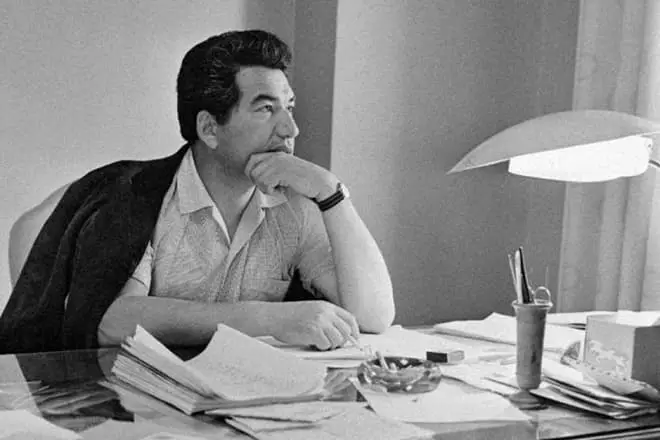
In 1933, he is already the second secretary of the Kyrgyz Regional Committee of the WCP (b). In 1935, a young leader became a student of the Red Professors Institute in Moscow, the family also moved to the capital of the USSR. During this time, Nagima gave birth to her husband of the son of Ilgiz, twins roar and Lucia (the boy died in infancy) and daughter Rose. In 1937, at the insistence of her husband, Nagima Khamzievna transported children to relatives to the shekeker.
The father of the future writer was arrested in September 1937 on suspicion of anti-Soviet nationalist activity and staging in Frunze (the capital of Soviet Kyrgyzstan). November 5, 1938 shot. The wife of the "enemy of the people" was amazed in rights, but all children of the repressed political worker received a higher education and entered each page in history.
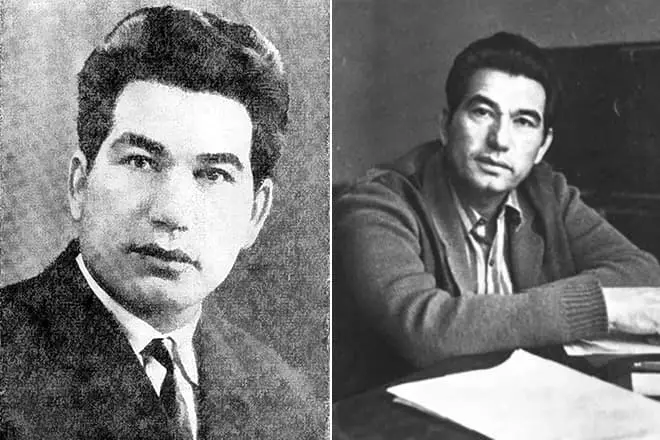
During World War II, all adult men mobilized, and Fourteen-year-old Chingiz turned out to be one of the most competent people in Aule and took the post of secretary of the Aulov Council. After the war, the young man was able to continue his studies: after the rural eight-year, he graduated with honors from the Dzhambul zootechniki and in 1948 he entered the Kyrgyz Agricultural Institute in Frunze.
Literature
The creative biography of the writer began on April 6, 1952 from the "Kyrgyzstan Kirgizi" published in the newspaper "Kyrgyzstan". The first artistic text of the aitmatov wrote in Russian - one of the two relatives. After graduating from the Institute in 1953, Genghiz Aitmatov, the Senior Zootachnik of the Kyrgyz Research Institute of Livestock, continued to write stories in Russian and Kyrgyz, publishing texts in local editions.
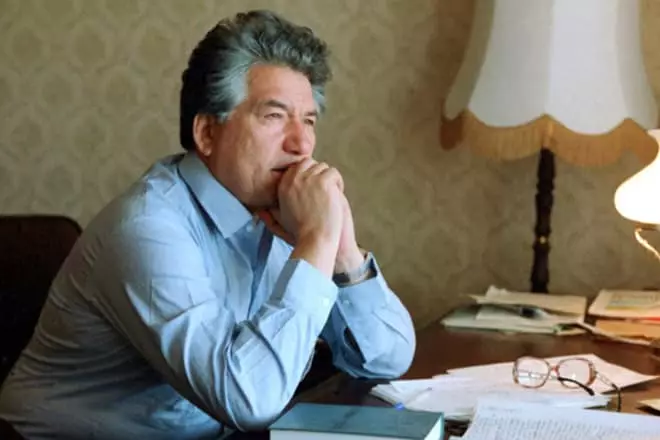
In 1956, decided to improve the qualification of the writer and went to Moscow, where he entered the highest literary courses. In parallel with studies wrote a lot. Already in June 1957, Ala-TOO magazine published the first story of a young writer "Face to face." In the same year, "Jamil" was published - it is interesting that the story that made the writer famous was published first translated into French.
Literary courses Writer graduated in 1958. By the time of the diploma, two stories and stories were published in Russian. The first Roman Iitmatova will be released only in 1980. In the novel "And the longest day lasts a day" the realistic events of the life of a rampant one with a fantastic line of contact of humanity with alien civilization are wondering. It seems that to achieve understanding with aliens people are easier than to agree among themselves.
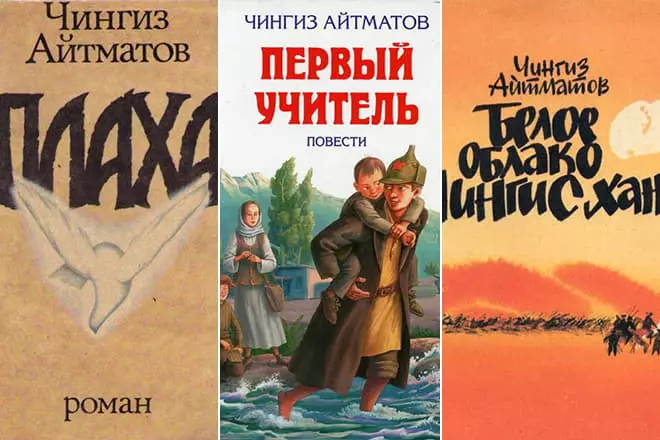
The writer returned to the genre of science fiction in the middle of the nineties, writing Tavro Kassandra - a story about creating artificial people. The remaining works are written in the genre of realism. In the Soviet Union, realism was socialist, but for the socialism of the aitmatis is too pessimistic. His heroes live and suffer to truly, not turning into vigorous builders of communism.
The main hero of the "White Steamer" is dying - a boy who believes in fairy tales when he kills his deer. In general, folk tales and legends are an important part of the plots of Aitmatov. Mythological images sometimes turn out to be brighter of the main characters. From the legend about the harsh invaders who turned prisoners in slaves, deprived of independence and memory, the Word and the concept of "Mankut" - a man forgot his roots into Russian.
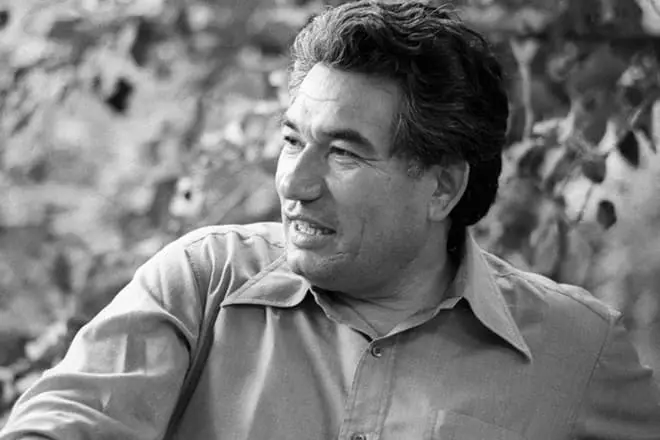
The second Roman Aitmatova, "Floha", comes out in 1986. During this period in the USSR, Mikhail Gorbachev began restructuring, and it became possible to write about the problems of the country. But even against the background of the permitted publicity "Floh" produces a striking effect - the novel raises several acute questions at once, talks about drug addiction and corruption, about the faith and ministers of the Church.
Personal life
The writer admired feminine beauty and deeply understood female character. Proof of this serve reliably and convex the written images of women in the books of Chingiza Aitmatov: Strong Jamil from the story of the same name, the young romantic Aselley ("Popolak is mine in Red Kosynka"), the wise of Tolgonai, who lost his sons in the war, but preserving the inner beauty of the soul ("Mother field ").
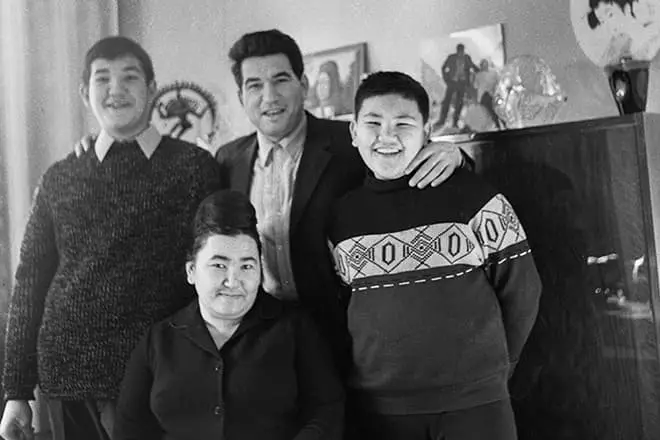
Almost every work there is a woman, from the appearance of which on the pages of the book becomes lighter in the soul at the main character or reader. And in the life of the writer, women's beauty played an important role. With the first wife, Kerez Shamshibayeva, Chingiz met while studying in the agricultural institute. The girl studied at the Medical Institute and also interested in literature.
After school, the Keerez excellent even received a direction to the Moscow Literary Institute, but material circumstances did not allow to leave. Kerez Shamshibayeva became an excellent doctor and supervisor, worked in the Ministry of Health of Kyrgyzstan. Gave birth to two sons. Sanjar Changizovich was born in 1954, he is a journalist and a writer, a businessman. Askar Changizovich was born in 1959, became an orientalist historian, a public figure.
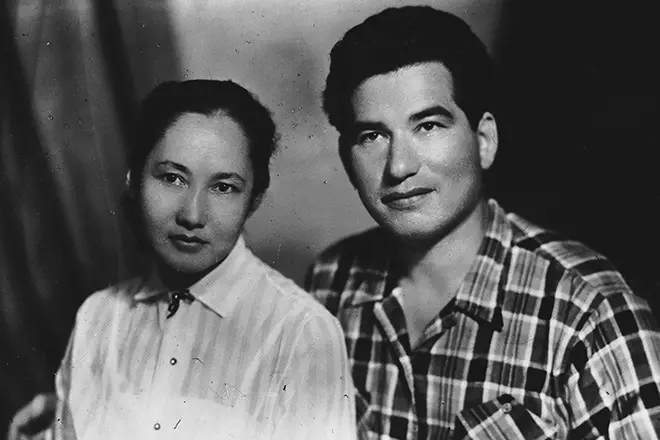
In the late fifties, Chingiz Aitmatov met the main love of his life - Ballerina Bybüchear Bayshenaliyev. Roman started in Leningrad and lasted fourteen years. Lovers could not get married: the high position of both required compliance with decency. The communist could not just divorce with his wife for marriage with the People's Artist of the USSR, followed by the first people of the state.
The experiences of the writer found an exit in his works. It suffers from the need to make a choice between the wife and mistress of Tanabe in the story "Goodbye, Gulsary." He falls in love with a widow, a brown unit in the novel "And the longest day lasts day." In both works, women are more persistent morally than the lyrical hero, ready to run the head of the new love.
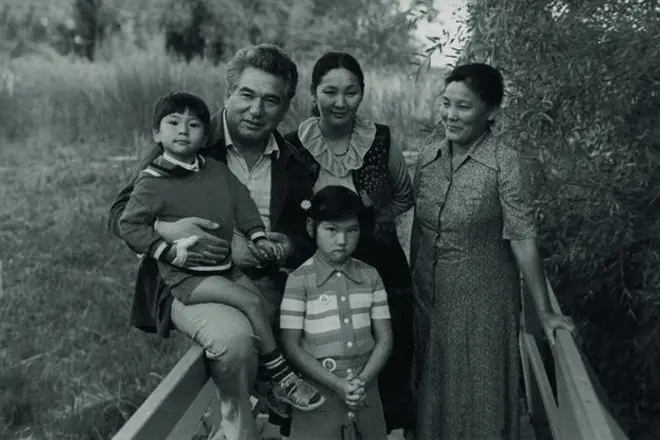
Fourteen years launched a secret connection, which a lot of wovers went to the republic. Bayshenaliyeva's budius died on May 10, 1973 after one and a half years of fighting breast cancer. Twenty years later, in collaboration with Mukhtar Shahanov, Aitmatov wrote the book "Confession at the end of the century" (the second name "Plachy of the Hunter Overcome"), in which he frankly told the story of this love.
The second wife of Chingiza Taekowich became Maria Urmatovna. By the time of exploring the famous writer, Maria managed to end the scenario Faculty of Vgika, to visit and give birth to the daughter of Cholpon. In the second marriage, the son of Eldar and daughter width were born. Eldar Chingizovich graduated from the Academy of Fine Arts in Belgium, he was a designer and an artist, leading the Museum of Aitmatov in Bishkek.
Death
Chingiz Aitmatov in the last years of life was sick diabetes, which did not prevent him from leading an active life. In 2008, the writer on the eightieth year of life went to Kazan on the shooting of the documentary "and the longest day lasts the day", which was filmed to the upcoming anniversary. On the set, the writer has bothered, the cold has passed into the sharp pneumonia, began to refuse the kidney.
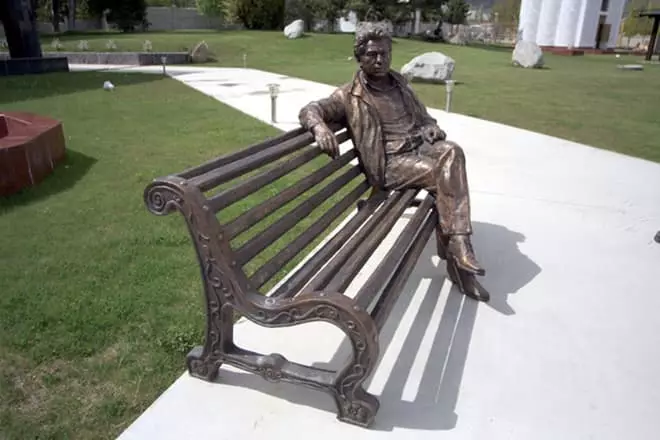
On May 16, Aitmatova was sent to Germany to Germany, but the doctors could not save the patient. On June 10, in Nuremberg's clinic, Genghiz Taskellich died, and on June 14, a solemn farewell and funeral of the classic of world literature took place. The grief gathered so much that several people fell from the stairs leading to the theater, where the coffin was stood with the body. It took the help of police and doctors in order to avoid victims.
The Cengiza Aitmatov was buried at Ata Bait Cemetery ("People's Ohloa") in the suburbs of Bishkek. This place chose the writer himself back in the nineties, when after a long search was able to find the burial place of the shot Torekul Aitmatov. In the general pit, 138 bodies found on Chon Tasha, which in 1991 with the honors rejected at Ata Baim. Next to the grave of the father wished to rest and Chingiz - a humanist, who had a lot of reflecting about the past and the future.
Bibliography
- 1952 - Judido Newspaper
- 1957 - "Face to face"
- 1957 - "Jamil"
- 1961 - My Topolak in the Red Kosynka "
- 1962 - "First Teacher"
- 1963 - "Motherboard"
- 1966 - "Farewell, Gulsary!"
- 1970 - "White Steamer"
- 1977 - "Pegii Dog, running the edge of the sea"
- 1980 - "Brunched half-in-law" ("and longer than a century day")
- 1986 - "Flah"
- 1995 - "Plaching a hunter over the abyss or confession on the outcome of the century" in collaboration with Mukhtar Shahanov
- 1996 - Tavro Kassandra
- 1998 - "Meeting with one Bahai"
- 2006 - "When the mountains fall (eternal bride)"
